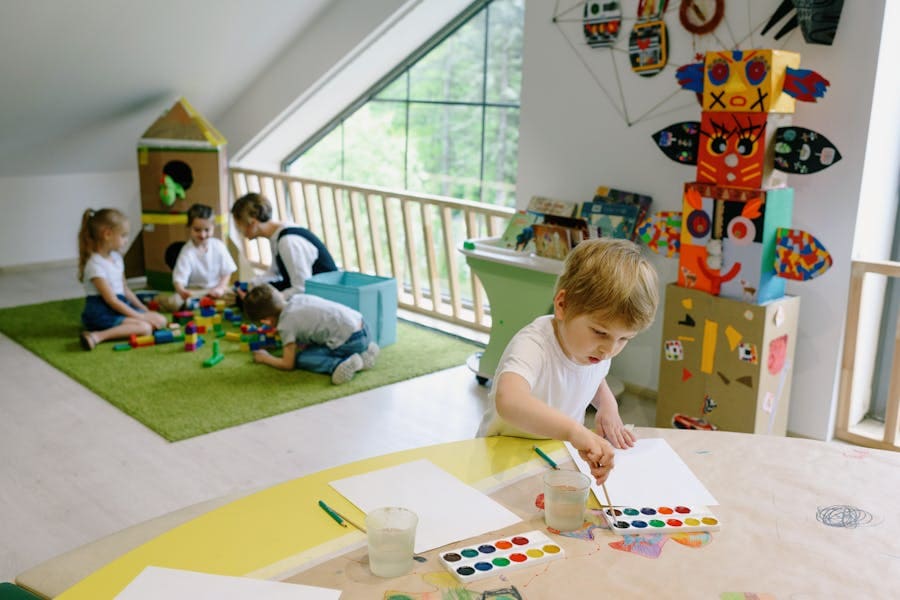Starting a preschool may be fulfilling business since it will provide children with the necessary early stage education and at the same time also satisfies the existing demand gap in regards to quality childcare. This is a step by step guide on how to start a preschool with some special focus upon India, the city of Mumbai and home-based preschools.
Steps to Start a Preschool
Step 1: Draft a Business Plan for Yourself
- Have a Goal: Have a clearly defined and long-term vision as to whether you would want to set up a Montessori preschool or play school.
- Identify your Target Audience: Specify what kind of parents you would like to reach and what do they want.
- Put Down Financial Expectations: Estimate how large financial commitment will have to be made to start such a business and what would be the operational expenses and the revenue that one would expect from the business.
Step 2: Be Aware of the Legal Requirements
- Legal Registration: Register your preschool using the local laws as a sole proprietorship, partnership or a private limited company.
- Business Licenses: Apply for required business licenses such as health trade license and fire safety certificate.
Step 3: Look for Finances
How much capital you require will depend on what you have drawn out in the business plan. The pre-operating and operating expenses for a preschool usually run from ₹ 2 lakh in rural India and can reach as high as ₹ 10 lakh for urban areas.
Step 4: Find an Appropriate Location
Find an environment that is secure and easy to get to for the children. Child-friendly spaces with a size ranging from around 1200 to 1500 sq. ft. are advisable.
Step 5: Set Up Infrastructure
- Design classroom and play area for learning and child safety.
- Acquire necessary toys, educational materials, and furniture.
Step 6: Develop a Curriculum
- Develop a curriculum that is suitable for the children’s age, providing opportunities in comprehensive areas of social, emotional, physical and cognitive development.
Step 7: Hire Qualified Staff
- Employ teachers who are trained in the profession (more so preprimary educators) as well as affable personnel for creating a conducive atmosphere.
Step 8: Marketing and Branding
- Include in the marketing plan how you will market your preschool to the community. Get parents’ attention through social media, internal advertisements, or local events.
Step 9: Open Your Preschool
- Host an inauguration function so that the community learns about your kindergarten and children can start registering.

How to Start a Preschool in India?
Basic requirements to start a preschool in India
It should be noted that for starting a preschool in India, the following basic requirements need to be adhered to:
- Educational Qualifications: Owner’s education is minimum 10+2; further qualifications concerning the pre-primary education level are added advantages.
- Legal Registration: Register with municipal local authorities and obtain legal documents such as licenses where necessary.
- Infrastructure: Confirm that the center is safe for children and is ready for child care services.
- Investment: The amount for first time investment depends upon the different locations – 2 to 10 lakhs depending on whether rural or urban area.
- Curriculum Development: If developing the educational material, ensure it is age appropriate for preschool learners.
Legal requirements to start a Preschool in India
Opening a preschool in India involves complying with a number of legal and regulatory conditions and here’s a tip of the iceberg for some necessary steps and certifications:
1. Business Registration
- Entity Formation – Preschools must be registered as trusts, societies, partnerships or private limited companies and this is crucial for the legal structure of the institution to enable it operate within the confines of the law of the land.
- Certificate of Incorporation – This can be got from the Registrar of Companies where one registers a company and it indicates that the preschool is legally in existence.
2. Licenses and Permits
- Trade License: This can be obtained from the relevant authority to cover legal operations within the specified area by the local municipal corporation.
- Non Objection Certificate (NOC): This can be obtained from the local education department allowing and confirming that there are no objections to the preschool being established.
- Health Trade License: A health trade license should be in place and be consistent with the health requirements of the local authorities.
3. Rigorous Regulation Requirements
In addition, in some states it is a requirement that the preschool be registered with the authorities such as the State Early Childhood Care and Education (ECCE) department, or someone else designated to that end. For instance, in Maharashtra, such registration is provided for by the Maharashtra Preschool Centres (Regulation of Admission) Act, 1996.
4. Physical Basics
Building Safety: In relation to this, it is the duty of the institution to ensure that their premises are within the standard building regulations of the area and are sanctioned in regard to safety, fire, sanitation, ventilation etc. It is possible that their area may also be subject to regular inspections.
Child-Safe Environment: Children are inquisitive beings, and adequate safety devises are essential with a proper strategy of childproofing the indoors and the outdoors premises of the school.
5. Standards for Health and Hygiene
It is also necessary to maintain high standards of hygiene practices in class and other care areas, to limit potential contaminating of the spaces from surrounding areas. Appropriate sanitation and pest control practices should also be ensured.
6. Qualifications of Staff
Based on the requirements set by the respective authorities, appropriately qualified employees should be hired. As a rule, teachers should have a minimum of the Secondary School Certificate but preferably not lower than a Diploma in Early Childhood Education.
7. Record Keeping
Ensure that admissions, daily attendance, progress reports, and monetary transactions are stored properly. Such documentation is useful for purposes of accountability and adherence to the rules.
How to Start a Preschool in Mumbai?
There are certain aspects of setting up a preschool in Mumbai that one must take note of:
- Market Research: Conduct surveys to find out the number of preschools in the target area and the level of demand.
- Franchising Options: There is also the option of establishing preschools within franchises such as Euro Kids or Kangaroo Kids as it will reduce the chances of development costs and risks of management.
- Site Choice: Select places with greater numbers of young families, guard against minors being within locations likely created without the right security measures.
- Cess Compliance: Make sure that any and all necessary licenses are acquired such as NOCs from the fire authority and the pollution control authority.
How to start a preschool at home?
Starting a preschool in your home: Procedure to Start Preschool at Home
It might be the case that setting up a preschool at home could be less troublesome but does require extensive planning:
- Space Preparation: Create a designated area in the house that is both safe and appealing for children.
- Home Based Preschool Licensing Requirements: Investigate the area regulations dealing with home preschools controlling; it could be that a special certificate or permit could be required.
- Lesson Planning: Create a lesson plan or individualized instruction that is well suited for young students that will be taught in the home.
- Promotion: Spread the word of your daycare by signing up for various community sites, using social networks, and through personal recommendations.
In light of the remarks above and taking into account the particular level of requirements for the context as such, i.e. the Indian context in general, the Mumbai context particularly, or the home-based context—the goal of establishing a preschool that is both educational to young children and economically feasible can be realized.

How to develop a curriculum for a preschool?
Developing a preschool curriculum is a great step for any institution that is Child Friendly. Using these steps below, anyone is able to develop an innovative, interesting and fit for a target group preschool curriculum:
Steps to develop a Preschool curriculum
1. Clarify Your Purpose and Intent
- Identify Learning Outcomes: Please specify what children should have learned by the time the year comes to an end. Make provisions for literacy and numeracy, social and emotional development, and physical coordination, which can be skills acquired during the desired timeframe of learning.
- Cultural Relevance: Your objectives must be linguistically and culturally responsive to the children in your care.
2. Understand Developmental Stages
- Age Appropriateness: Structure the curriculum in a way that it targets preschool: ages 2-6 year children. The learning should be active and focus on their level of curiosity and energy.
- Individual Needs: Recognize that each child is unique; incorporate flexibility to accommodate different learning styles and paces.
3. Curriculum Program Model Selection
- Identification of relevant Framework that Works: Explore with various education philosophies such as the Montessori, Reggio Emilia, and others to find out which one fits into your understanding of early education and what you believe in.
- Cross Curriculum Integration: The model chosen should be such that it permits integration across subjects as well as advocates development in different aspects.
4. Incorporate Play-Based Learning
- Learning Through Play: Develop tasks that can easily assist in the learning process. These can be role play, arts & crafts, or even sensory activities.
- Structured Activities: Not all focus should be given to free play but set aside some time to have targeted tasks to promote learning.
5. Set Monthly or Seasonal Units
- Monthly Themes: Establish thematic units that cut across different subjects and concepts. For instance, a Nature theme can relate to science (botany), arts (nature art), and language (animal stories).
- Seasonal Activities: Use seasonal themes so that the content taught is interesting to the learners and relevant.
6. Create Lesson Plans to Assist in The Learning Process
- Detailed Planning: Create separate lesson plans to effectively teach different topics by detailing the teaching activity, resource materials and the evaluation method. Each of these plans must specify:
- The aim of the teaching
- Procedures and approaches.
- Methods of evaluation – those aimed at observation, checklists.
- Time Management: Decide the expected duration of every task so that moving from one task to another is seamless.
7. Assessment and Feedback
- Monitor Progress: Employ assessment techniques like observation forms or checklists to observe behavioral progress across various developmental domains for the child in reference to the expected learning gaps.
- Modify Curriculum: Accept suggestions from both the parents and the staff so that you can further improve the curriculum.
8. Professional Development
- Training for Educators: Advocate for sustained professional development of teachers with regard to the training on early childhood education practices and experts.
These actions will help you develop a comprehensive preschool program with the desire to exhume children’s passion towards learning attractive while still considering their developmental stages. Update and revise the curriculum in regular intervals along with incorporating feedback and newer educational developments for greater effectiveness and interest.

Some effective assessment tools for preschoolers (Preschool Teachers)
Here are some effective assessment tools for preschoolers or preschool teachers:
- Observation Checklists: I noticed many preschool teachers use these systematic tools of recording children’s actions and skills during the activities, which means the teacher can observe changes over time.
- Portfolios: Portfolios are the collection of children’s works, projects, and evaluations to reach out to the detailed account of the children’s achievements and learning history.
- Ages & Stages Questionnaire (ASQ): The ASQ is the most used tool used for screening and prioritizes children aged between four to sixty months. It Evaluates language, gross and fine motor, problem-solving, and personal-social development domains.
- Developmental Checklists: These are cross-referenced lists indicating key development milestones for various domains cognitive, physical, social-emotional teacher achievements.
- Performance Assessments: Performance assessments are those in which children narrate stories or engage in art projects, and these activities are helpful in measuring several emerging skills.
- Standardized Tests: These are specially prepared to test specific skills and knowledge against a criterion – eg Peabody Developmental Motor Scales.
- Teacher Ratings: These tools assess the children’s progress and development in smartness, languages and social emotional development among other issues.
- Parent Surveys/Questionnaires: This includes collecting data from the parents concerning the particular child concerning child’s behavior and development at home.
- Transdisciplinary Play-Based Assessment (TPBA): The transdisciplinary play-based assessment measures children’s development through playtime and interaction with adults in a familiar environment.
- Work Sampling System (WSS): A systematic assessment tool that integrates portfolio assessments with standard objectives and timelines in order to track and evaluate a child’s development over the time.
These assessment tools may assist preschool teachers in collecting important information concerning the status of development and learning for pupils and provide assistance in designing instruction and adaptation.
Must Read,
✔️ Top 17 Best Preschool Franchise in India
✔️ How to Start Tour and Travel Business?
Conclusion
In conclusion, setting up a preschool in India comes with several legal facets which aims in meeting certain educational parameters as well as ensuring the security of the children in the preschool. However, if one manages to obtain the necessary registrations and licenses, as well as follows the guidelines regarding infrastructure, it is quite possible to set up a preschool where young children are provided with education in a secure atmosphere. It is wise to speak to local authorities or lawyers regarding any changes that have happened in relation to the operative laws in that region.
Frequently Asked Questions (FAQs)
-
How much does it cost to start a Preschool in Mumbai?
The average startup capital for a preschool in Mumbai is about ₹5 lakhs to ₹15 lakhs. However, the expenditures may be different regarding factors like location, size, and levels of the facility. Other important costs include the following:
Lease/Rent Costs: The price that will be charged for the premises.
Setup and Renovation Costs: Set-up of furniture that is safe for use by children, educational materials and safety fittings.
Permit/License Acquisition Costs: Cost incurred in seeking for necessary permits and licenses.
Pre Teaching Staff Expenditure: Initial payment of appointed teachers and support staff. -
What qualifications do I need to open a Preschool at home?
If you want to set up a preschool at home in India, generally you should have:
Minimum Qualifications: Minimum required qualifications is 10 +2 (HSC) qualification.
Graduate Diploma in Early Childhood Education It is mandatory to hold a diploma in Pre-Primary Teaching/Early childhood education, so as to equip the individual with knowledge of development in children, and effective teaching techniques[1][4].
Working Qualifications: Previous working experience in childcare, teaching or any other field is not compulsory but preferable. -
What are the best locations for a Preschool in residential areas?
Most suitable locations for a preschool within a residential area are:
Locating Them Close to Schools: Parents who want their children to finish their education from the same institution are some of the people who may look for a primary school that has a preschool attached to it.
Community Centers: Target areas, if they have a park or a community center, are more favorable for outdoor activities.
Family-Dense Neighborhoods: This scenario results in steady enrollment since there are lots of families with young children. -
Are there any government grants available for starting a Preschool in India?
In terms of money, apart from the fact that specific grants for the creation of preschools do not exist, some schemes have been developed for other types of programs related to early age education. A few of these are:
National Early Childhood Care and Education (ECCE) Policy: Offers cooperation and guidance for improving preschool education.
State Specific Schemes Experienced counties might offer to develop their own programs for national funding or include their scope into subsidizing educational institutions. One should contact the local Government bodies for available options. -
How long does it typically take to obtain all the necessary Licenses for a Preschool?
The time necessary for acquiring all the required permits is different in different places, but generally it takes about 3 to 6 months. This includes the following:
Preparation Time: It means collecting documents and infrastructure pre requisites.
Approval Process: Local authorities should take time to assess the applications submitted and inspecting the premises that are the subject of the application. -
What are the specific Certifications needed to open a Preschool in different states of India?
Acceptance of all the documents which are needed can change from state to state but generally include:
Trust/Society/Company Registration: Depending on how you would like to organize your preschool.
Trade License: This is obtained from the local municipal corporation.
Non-Objection Certificate (NOC): Issue by local education authorities like Bureau of Education.
State Registration: This is obtained from the respective State Early Childhood Care and Education (ECCE) department.
Health and Safety Certifications: Adherence to local health and safety requirements.
Additional requirements shall however be available in free hand though it is always better to first check the local requirements before going ahead.









